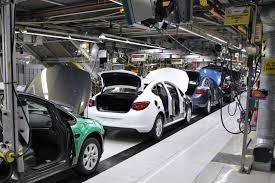Driving Forward: The Impact of Vehicle Trade Advocacy on the Automotive Industry

Vehicle Trade Advocacy: Shaping the Future of the Automotive Industry
In today’s rapidly evolving automotive landscape, vehicle trade advocacy plays a crucial role in shaping industry policies, regulations, and practices. As the automotive sector navigates through technological advancements, environmental concerns, and changing consumer preferences, advocacy efforts are essential to ensure a competitive and sustainable future.
The Importance of Vehicle Trade Advocacy
Vehicle trade advocacy involves representing the interests of automotive manufacturers, dealers, suppliers, and other stakeholders in discussions with policymakers, regulatory bodies, and industry organizations. By advocating for fair trade practices, supportive regulations, and market access opportunities, advocates help create a level playing field for businesses and promote economic growth within the automotive sector.
Key Issues Addressed by Vehicle Trade Advocacy
Advocates focus on addressing a wide range of issues that impact the automotive industry. These may include:
- Tariffs and trade barriers that affect the import and export of vehicles and parts
- Regulatory standards related to vehicle safety, emissions, and fuel efficiency
- Consumer protection laws governing vehicle sales and service practices
- Industry-specific challenges such as supply chain disruptions or workforce development needs
The Role of Advocates in Driving Change
Vehicle trade advocates work tirelessly to influence policy decisions at local, national, and international levels. Through research, lobbying efforts, coalition building, and public outreach campaigns, advocates strive to shape legislation and regulations that support a thriving automotive industry.
Looking Ahead: The Future of Vehicle Trade Advocacy
As the automotive industry continues to undergo transformational changes driven by technology innovation and shifting market dynamics, vehicle trade advocacy will remain a critical force for progress. By staying informed about emerging trends, engaging with stakeholders across the value chain, and advocating for policies that foster innovation and sustainability, advocates can help drive positive change within the industry.
In conclusion, vehicle trade advocacy plays a vital role in shaping the future of the automotive industry. By championing policies that support competitiveness, sustainability, and innovation, advocates contribute to a vibrant ecosystem that benefits businesses, consumers, and society as a whole.
Steering Success: Navigating the Essentials of Vehicle Trade Advocacy in the Automotive Industry
- What is vehicle trade advocacy?
- Why is vehicle trade advocacy important in the automotive industry?
- Who participates in vehicle trade advocacy efforts?
- How does vehicle trade advocacy influence government policies and regulations?
- What are the key challenges faced by advocates in vehicle trade advocacy?
- How can individuals and businesses get involved in vehicle trade advocacy?
- What are the potential benefits of successful vehicle trade advocacy initiatives?
What is vehicle trade advocacy?
Vehicle trade advocacy refers to the efforts made by individuals, organizations, and industry stakeholders to support and promote the interests of the automotive sector in discussions with policymakers, regulatory bodies, and relevant institutions. It involves advocating for fair trade practices, favorable regulations, and market access opportunities that benefit automotive manufacturers, dealers, suppliers, and other industry players. By engaging in vehicle trade advocacy, advocates aim to create a conducive environment for sustainable growth, innovation, and competitiveness within the automotive industry.
Why is vehicle trade advocacy important in the automotive industry?
Vehicle trade advocacy is crucial in the automotive industry for several reasons. Advocates play a key role in representing the interests of manufacturers, dealers, suppliers, and other stakeholders in discussions with policymakers and regulatory bodies. By advocating for fair trade practices, supportive regulations, and market access opportunities, advocates help create a level playing field for businesses and promote economic growth within the industry. Additionally, vehicle trade advocacy addresses critical issues such as tariffs, regulatory standards, consumer protection laws, and industry-specific challenges, ensuring that the automotive sector can navigate through complex challenges and thrive in a competitive global marketplace.
Who participates in vehicle trade advocacy efforts?
In vehicle trade advocacy efforts, a diverse range of stakeholders actively participate to drive meaningful change within the automotive industry. This includes automotive manufacturers, dealerships, suppliers, trade associations, industry experts, policymakers, regulatory bodies, and consumer advocacy groups. By collaborating and coordinating their efforts, these participants work together to influence policy decisions, promote fair trade practices, address industry challenges, and advocate for regulations that support a competitive and sustainable automotive sector. Their collective engagement underscores the importance of a collaborative approach in shaping the future of vehicle trade advocacy.
How does vehicle trade advocacy influence government policies and regulations?
Vehicle trade advocacy plays a significant role in influencing government policies and regulations related to the automotive industry. Advocates engage with policymakers, regulatory bodies, and legislators to provide insights, data, and recommendations that shape the development of laws and regulations affecting vehicle trade. By highlighting the economic impact of certain policies, advocating for fair trade practices, and promoting industry-specific interests, vehicle trade advocates help ensure that government decisions align with the needs of automotive manufacturers, dealers, suppliers, and consumers. Through strategic advocacy efforts, stakeholders can influence the creation of a regulatory environment that fosters innovation, competitiveness, and sustainability within the automotive sector.
What are the key challenges faced by advocates in vehicle trade advocacy?
In the realm of vehicle trade advocacy, advocates encounter several key challenges that shape their efforts to influence policy and promote industry interests. One significant challenge is navigating complex regulatory frameworks that vary across jurisdictions, requiring advocates to stay informed and adaptable to effectively address diverse issues. Additionally, advocating for fair trade practices in a globalized market presents hurdles related to tariffs, trade barriers, and international agreements that impact the flow of vehicles and parts. Moreover, balancing the interests of different stakeholders within the automotive ecosystem, such as manufacturers, dealers, and consumers, can be a delicate task that requires strategic communication and negotiation skills. Overall, the multifaceted nature of vehicle trade advocacy demands resilience, expertise, and collaboration to overcome these challenges and drive positive change in the industry.
How can individuals and businesses get involved in vehicle trade advocacy?
To get involved in vehicle trade advocacy, individuals and businesses can take several proactive steps. One way is to join industry associations and organizations that focus on advocacy efforts within the automotive sector. By becoming members, individuals and businesses gain access to valuable resources, networking opportunities, and a platform to voice their concerns and ideas. Additionally, staying informed about relevant policy issues, attending industry events, and engaging with policymakers can help individuals and businesses contribute to advocacy initiatives. Collaborating with like-minded stakeholders, participating in advocacy campaigns, and sharing insights with industry peers are also effective ways to make a meaningful impact in vehicle trade advocacy efforts.
What are the potential benefits of successful vehicle trade advocacy initiatives?
Successful vehicle trade advocacy initiatives can yield a multitude of benefits for the automotive industry and its stakeholders. By effectively advocating for fair trade practices, streamlined regulations, and market access opportunities, these initiatives can help create a more competitive and level playing field for businesses. This can lead to increased market opportunities, improved industry standards, and enhanced consumer confidence. Additionally, successful advocacy efforts can foster innovation, drive economic growth, and contribute to a sustainable and thriving automotive ecosystem. Ultimately, the potential benefits of successful vehicle trade advocacy initiatives extend beyond individual businesses to positively impact the industry as a whole.



